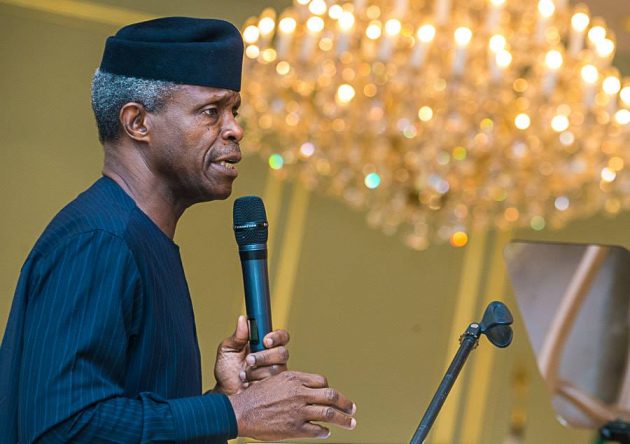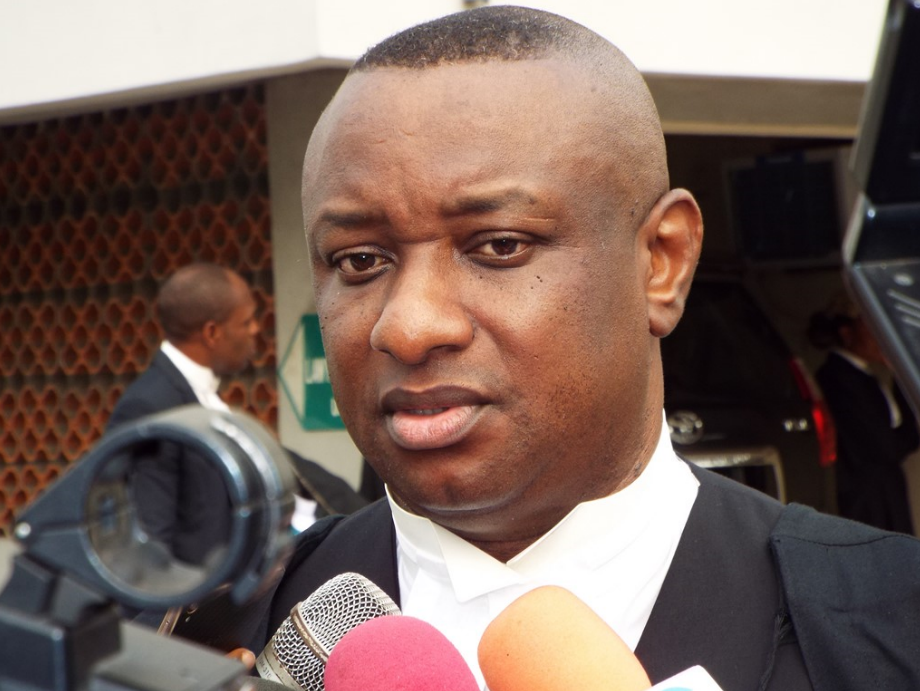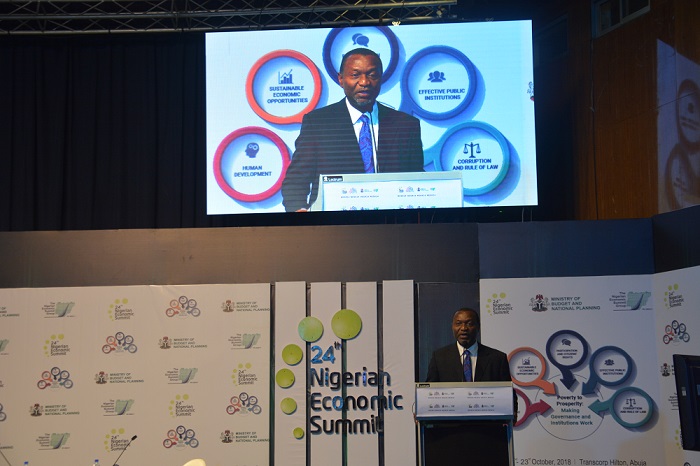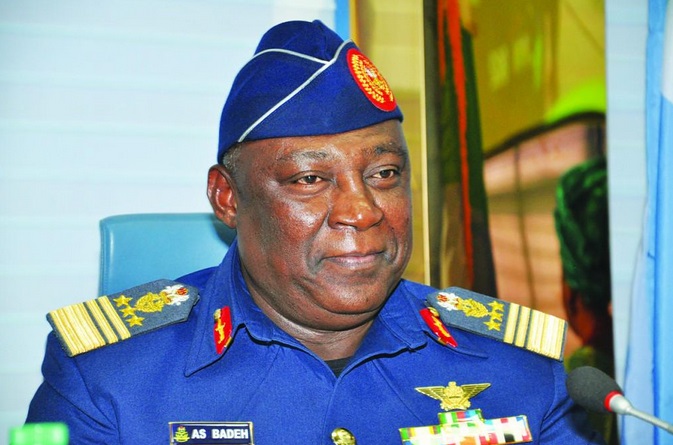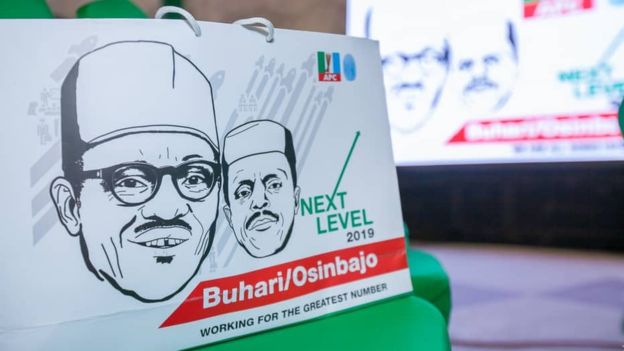Within the last five months, some key actors in the President Muhammadu Buhari administration have suggested that support for their principal in the forthcoming presidential election is the only guarantee that agitations for the Presidency by the South-East and the South-West, (which is not actively agitating) could manifest. It started when the Secretary to the Government of the Federation, Mr Boss Mustapha, indicated, sometime in July, that the South-East could have its near lifelong dream of ruling Nigeria again fulfilled if it worked for Buhari’s return to office.
According to the SGF: “The Presidency of Nigeria is negotiable and can only be done on the position of strength and the strength of the Igbo will be determined by their 2019 support for Buhari…” So, the Presidency is negotiable? Who are those sitting at the negotiating table and on whose mandate and interest?
Then, last Saturday, Vice President Yemi Osinbajo, proposed that the success of President Buhari in the 2019 election was the only way the South-West region could secure the Presidency in 2023.
Osinbajo had said: “Yoruba has (sic) a lot to contribute to Nigeria for the 2019 elections. It is for us the Yoruba, if you understand, it is for us. We are not looking at 2019, but 2023. If we don’t get it now, it may take some time again.” This followed a similar assertion made by the Minister of Power, Works and Housing, Mr. Babatunde Fashola, at a town hall meeting in Ibadan a couple of weeks back.
Advertisement
Now, unlike the obvious steps it took to see one of its own become the President at the return to democratic rule in 1999, there has been no widespread campaign for the Presidency in the South-West. So, it is curious that Osinbajo would say that the region has its eyes set on 2023 unless of course voting for President Buhari is the key to handing over the Presidency to other zones, even if they do not ask for it or there is some high personal ambition that is being equated with regional interests. Then, the question of whether politics in Nigeria should not move away from this base ethnic instinct now that Nigeria is in the hands of those who profess to be progressive politicians?
Within every possible level of contemplation, you would expect that progressive politicians would discountenance anything counter-productive and antithetical to the development of society irrespective of what they stand to gain or lose from a reformed mindset. In a country like Nigeria, for example, expectations would be a redirection of national discourse away from those things that tear the country apart to a re-focus to productive engagements ultimately towards affecting the outlook of the citizenry positively.
For instance, religion and ethnicity are two of the most debilitating factors to the growth of Nigeria. It is indeed possible to suggest that these two primordial considerations have done more harm than good to the Nigerian psyche than the very oft-touted enemy known as corruption.
Advertisement
While it is true that corruption is of real pervasive dimensions in Nigeria, the preference of Nigerians for ethnic and religious considerations in the allocation of public office to the disadvantage of merit is the major reason for the country’s stunted growth. At every point in the history of a society, there is a person, best suited for the position of leadership for that moment. It could be because of certain experiences that he has gone through, some education that he has got or just some merit-based capacity that can benefit society at that period. While the nation will continue to exist even if it does get that person into office at this auspicious time, it would most certainly lose time in the track of development, ultimately having to pay for those years in the future. This is the dilemma that Nigeria has repeatedly found itself in its 58 years of independence. At no time in the history of this country has the issue of ethnicity not been the most critical factor in the decision of leaders even at state levels.
In the warm-up to the 2015 elections for example, seven governors elected on the platform of the Peoples Democratic Party embarked on a do-or-die mission of getting a politician of northern extraction into the office of President. It did not matter that the North had held that position for 33 out of Nigeria’s 54 years of independence at that time and that the North in particular, and the nation in general, had little to show for it. All that mattered to them, and their supporters was the bragging right that their region had produced the President. It got so bad that many supporters of this project threatened that Nigeria would be history if the northern presidency pet project failed.
The North was not alone in this ethnic pursuit of the Presidency. The kinsmen of then President Goodluck Jonathan also issued threats of war. One of the few surviving participants in the politics of the First Republic, a man now in his 80s, was on the train of those threatening to support the pulling down of this country if Jonathan lost his bid to remain in power in 2015. None of these warmongers cared about whether their man had moved the country forward or set it back in the years that he held the Presidency; all that mattered to them was to see one of their own at the Presidential Villa!
So, it should not surprise anyone that Nigeria is plagued with one of the most pathetic leadership deficits in the world. When a country discards merit for ethnic expediency in the attainment to political leadership, it is impossible that anything other than mediocrity and failed potential would be the lot of such a nation. Legendary writer and novelist, Chinua Achebe, puts it succinctly in his seminal work, The Trouble with Nigeria, as follows: “But whereas tribalism might win enough votes to install a reactionary jingoist in a tribal ghetto, the cult of mediocrity will bring the wheels of modernisation grinding to a halt throughout the land.” Sadly, this prophecy is Nigeria’s extant reality.
By May 2019, Nigeria would have had a leader of northern extraction for 37 of its 58 years of independence. Yet, the common man in the region still grapples with the worst type of grinding poverty, abject lack of opportunities and an increasingly precarious security situation.
Advertisement
Nigeria now has an out-of-school children population conservatively put at 13.2 million, the highest from a single country in the world! The United Nations Children Education Fund says that at least 60 per cent those children are in northern Nigeria. This means that the North is not currently just lagging, it is not preparing for the future.
Records also indicate that the northern part of Nigeria remains extremely poor and is the worst in human development in the country. According to a report published in BUSINESSDAY on April 10, 2018, the 2017 Oxford University Poverty and Human Development Initiative, Nigeria Country Briefing, 2017, identified poverty in the North-East and North-West of the country as the highest.
The region posted an average of 85.36 per cent in poverty with six states ranked as “worse states.” These are Zamfara with 92% poverty rate; Jigawa, 88%; Bauchi, 87%; Kebbi, 86%; Katsina, (which happens to be the home state of the current President), 82.2% and Gombe with 77% poverty rate!
The condition of the woman in Northern Nigeria is one of the worst in the world now. And that would be no surprise at all if you consider the multiple effects of lack of education as it reflects in early marriage cum pregnancy and the lack of adequate medical attention which could lead to anything from lifelong deformation to maternal and infant death. And just as well, the question about what the cumulative 11 years of an Olusegun Obasanjo leadership did for the South-West or ways that a Goodluck Jonathan’s five years Presidency and 16 years in various political capacities, improved the condition of the people of the South-South when people in his Otuoke village were said to lack access to potable water! So, of what benefit is the origin of the President to the country and the people who begot him?
Those who want Nigerians to return President Buhari to power should talk about his numerous achievements, if any, and the advantage of sustainability that may attend his re-election. Resorting to ethnic sentiment is cheap blackmail, unhelpful to national integration, the growth of democracy in Nigeria and may indeed be an unwitting albatross to the same ambition that these respected men are marketing. This country is under the siege of poverty and insecurity such that many Nigerians have lost hope in the capacity of our leaders to bring back national prosperity and rebuild the nation. So, the promotion of geographical location of power at the highest level of governance and by a supposedly cerebral Vice President whose intellectual approach to issues ordinarily inspires confidence is a grim evidence of shallowness of the country’s politics. No matter what it costs, those with any intellectual endowment in today’s politics owe this country the institution of ideas that propel leadership with the capacity to build a new Nigeria where competence, fellow-feeling and honesty are valued beyond politics and politicking.
Advertisement
Twitter @niranadedokun
Advertisement
Views expressed by contributors are strictly personal and not of TheCable.
Add a comment

